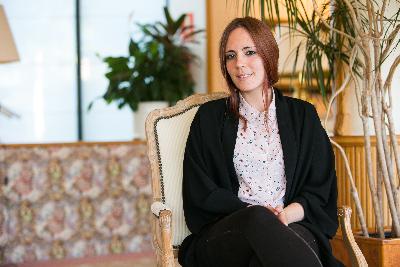Collective residencies / NEW JOURNALISM II / Olot
CELIA CASTELLANO
From Monday, 24 September 2018 to Sunday, 30 September 2018

Bio
Celia Castellano is a freelance journalist currently based in Barcelona. She is member and responsible for communication of SomAtents and she’s a regular contributor to La Directa newspaper and Diari Public. She also has worked to El Periódico de Catalunya and her work has been published at Vice, La Marea, Ariet and Pikara Magazine. Currently, she is developing several projects about social and ethnical conflicts in the eastern Europe and is exploring the relation between football and conflicts.
Castellano is graduated in journalism and took a master’s degree of Contemporanean History, from Autonomous University of Barcelona (UAB).
Project
During the days of residence at the Faber, together with the photojournalist Carlos Palacio, we will work on a project of segregation of ethnic minorities in the Balkans and prepare a new course on the importance of the joint work of the editor and the photographer in the chronicle. Independently, I will work on the new SomAtents Communication Plan that will face a new phase of the project next year.
An opportunity
This September’s stay at Faber has been a very productive experience. Needless to say, it is stimulating to get to know other projects, to establish synergies between collectives and media from all over the world, to exchange visions and to modify schemes about a profession —journalism— that is subject to constant changes and, unfortunately, little valued. It has undoubtedly been an exciting encounter. Above all, however, it has been an ideal space to work intensively and in a coordinated manner on the project of the Somatenes journalistic collective, which is currently being reformulated: a stage complex, risky, in which the understandable tensions of any change emerge.
The team’s need to find spaces in which to work, debate, disagree and connect, both professionally and humanly, has become an unattainable luxury, habitually subjected to a rhythm of life and frenetic work. La Faber, however, has allowed us a week of truce, to break the dynamics of telematic communication, which are slow, unfunctional and not at all friendly, putting at our disposal their resources to mature the project and open new lines of work. In particular, as a professional, a member of the team and a colleague, I can only say thank you.
Finally, during my stay at Faber, I was able to park my usual work in order to go deeper into the documentation of my personal project on ethnic minority discrimination in the Balkans, to which I have dedicated myself for the last year in a precarious manner and with an absolute lack of material time and mental space. And I write these lines from the airport, a few hours away from taking a flight, to try to open a path to which, whatever it is finally, the Faber Residency, for the second time, has contributed.
